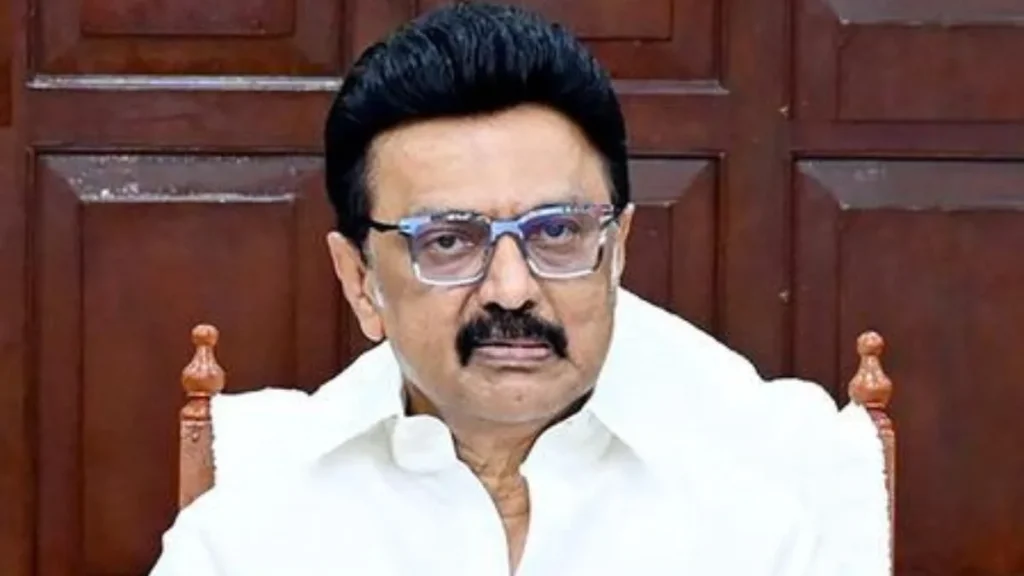Listen to the article
In a pointed critique that highlights growing tensions between state and central governments, Tamil Nadu Chief Minister MK Stalin has unleashed a series of questions challenging the Union Government’s policies on electoral processes, language impositions, and treatment of opposition-ruled states.
Speaking out on social media platform X, Stalin’s comments follow a detailed presentation by Tamil Nadu Finance Minister Thangam Thennarasu in the state assembly, who accused Prime Minister Narendra Modi’s government of discriminatory financial allocations and infrastructure development that favors BJP-ruled states like Uttar Pradesh over Tamil Nadu.
“Not only the Honorable Finance Minister Thangam Thennarasu, but the hearts of the people of the nation are also filled with numerous questions,” Stalin wrote, before launching into specific criticisms that touched on multiple contentious issues between his DMK-led government and the BJP-led central administration.
The Tamil Nadu Chief Minister questioned what he called the “washing machine” effect of the BJP alliance, suggesting that corruption allegations against politicians mysteriously disappear once they join forces with the ruling party. This metaphor has become a common refrain among opposition leaders who accuse the BJP of selectively pursuing corruption cases against political opponents while sheltering allies.
Stalin also took aim at what many southern states view as Hindi imposition, asking: “What kind of arrogance is it to name the nation’s important projects and laws only in Hindi and Sanskrit?” This reflects long-standing concerns in Tamil Nadu and other non-Hindi speaking states about perceived linguistic hegemony from the central government.
The ongoing friction between governors appointed by the central government and state administrations led by opposition parties also featured prominently in Stalin’s critique. “What do you achieve by creating chaos in states ruled by opposition parties?” he asked, alluding to tensions between Tamil Nadu’s government and Governor R.N. Ravi, who has withheld assent on several bills passed by the state legislature.
Stalin specifically questioned the Special Intensive Revision (SIR) of electoral rolls, asking why it appears to “support vote theft for the BJP’s election victory.” The DMK and other opposition parties have raised concerns about electoral roll revisions potentially disenfranchising certain voter groups ahead of future elections.
Cultural and historical recognition emerged as another point of contention, with Stalin criticizing what he perceives as attempts to downplay Tamil Nadu’s archaeological significance. He referenced scientific reports about iron antiquity in Tamil Nadu and accused the central government of trying to “suppress the Keezhadi report” – referring to archaeological excavations that have yielded evidence supporting the ancient origins of Tamil civilization and its written script.
“Why is there a reluctance to even acknowledge the scientifically proven report from Tamil Nadu regarding the antiquity of iron? Why resort to somersaults to suppress the Keezhadi report?” Stalin asked, touching on sensitive issues of cultural identity and historical recognition that resonate deeply in Tamil Nadu.
The exchange highlights the deepening federal tensions in India, where states governed by opposition parties increasingly claim discriminatory treatment in resource allocation, policy implementation, and cultural recognition from the central government.
Political analysts note that such center-state friction has intensified in recent years, particularly in states like Tamil Nadu where regional identity and linguistic pride form core political values. The DMK government’s vocal stance represents not just partisan opposition but also reflects long-standing concerns about preserving the state’s autonomy and cultural distinctiveness within India’s federal structure.
Stalin concluded his remarks by asking whether these questions would receive genuine answers or if they would be met with “false propaganda through WhatsApp University” – a derisive reference to misinformation often spread via social media platforms.
Fact Checker
Verify the accuracy of this article using The Disinformation Commission analysis and real-time sources.




9 Comments
The Chief Minister’s criticisms highlight the need for better coordination and consensus-building between state and central governments. A collaborative approach would serve the people’s interests best.
The ‘washing machine’ effect is an interesting metaphor. It raises questions about accountability and the integrity of the political process. Investigating these claims thoroughly is important for upholding democratic principles.
Allegations of linguistic hegemony and discriminatory policies are serious. Transparent dialogue and inclusive policymaking should be the priority to resolve such tensions.
This dispute raises important questions about the balance of power and the rights of states within India’s federal structure. Impartial institutions should investigate the claims and ensure fair treatment for all.
The allegations of uneven allocation of resources and infrastructure development are worrying. All states should receive fair treatment regardless of political affiliation. Impartial oversight is needed.
Agreed. Central policies should serve the interests of all citizens, not just those in politically aligned states.
This is a concerning development. Linguistic and political hegemony can erode democratic norms. I hope the central government addresses these criticisms in a transparent and impartial manner.
These are complex issues at the intersection of language, politics, and resource allocation. I hope all parties involved can find constructive ways to address the concerns in good faith.
As an observer, I’m curious to see how this dispute between state and central governments unfolds. Maintaining healthy federalism is crucial for India’s long-term stability and progress.